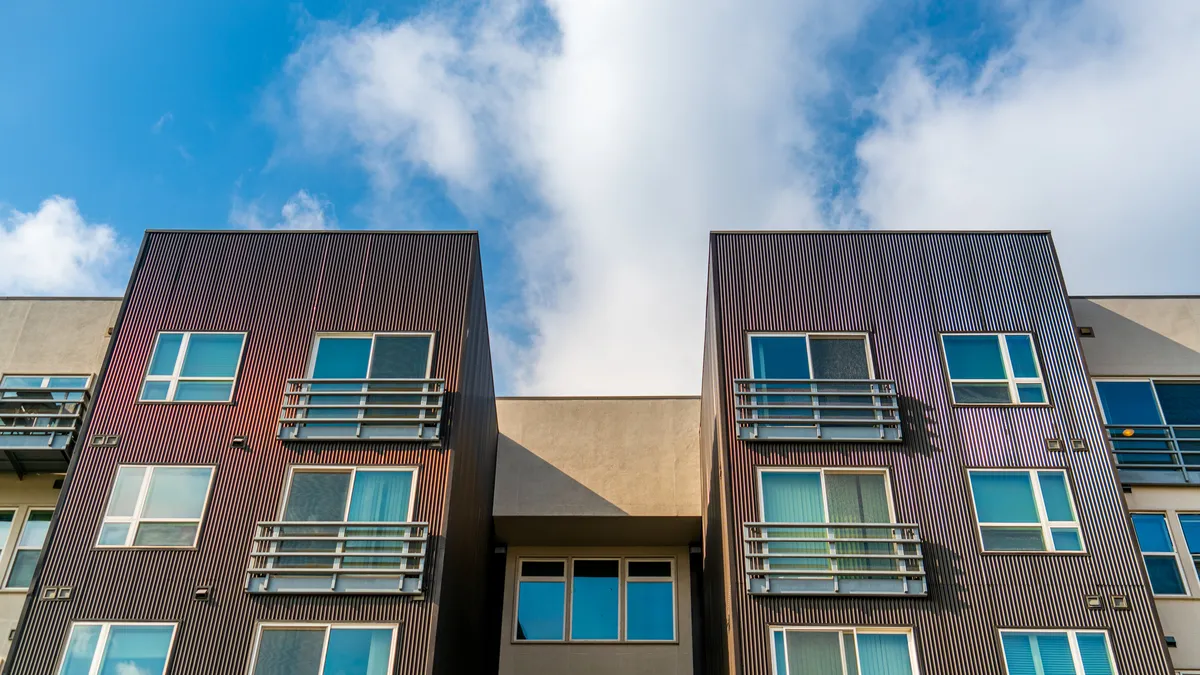For apartment owners, early 2022 may be as good as it gets.
Rents have been rising for more than a year, but Brad Dillman, the chief economist for Atlanta-based Cortland, says rent growth hit its annual peak in the first quarter across the 700 submarkets he tracks.
"We've had this explosive, crazy rent growth," Dillman said. "It's going to slow down over the remainder of this year and into next year and then be at a level that's more consistent with the past, albeit a little bit higher."
Inflation also plays a pivotal role in Dillman's modeling. He projects rent growth to hit 9.5% this year, but an inflation rate of 8% will temper that growth.
"I do think inflation is going to slow down a little bit, but there is certainly a slowdown [in rent growth] compared to last year," Dillman said.
Here, Dillman talks with Multifamily Dive about rent growth, asset values and interest rates.
This interview has been edited for brevity and clarity.
MULTIFAMILY DIVE: What type of movement are you seeing to properties in your Sun Belt portfolio?
BRAD DILLMAN: The type of product that we have tends to appeal to people who recently moved. A very large proportion of new leases that we signed last year in a handful of assets in Florida were from people who had moved from a separate metropolitan area — typically out of state. We can see how people are taking an income that was generated somewhere else, like in New York or California, and deploying that income in places like Florida. That is affecting rents and having secondary effects socially in markets.
We can see this trend in the data. We have people state their incomes when they're going to sign a lease. There are places in Florida that are seeing income growth of 50%.
Do you think people will continue to be able to earn New York salaries, for instance, while they live in Florida?
I think there will be some corrections to it. It's going to get reflected in local prices, which, for example, is part of the reason that Boise is booming. But businesses will correct too. They determine that they don't need to be paying people these outsized wages if they're in a different part of the country. So I think we're in the process of that changing.
Is there any concern about what people are paying for apartments in certain markets right now?
From my perspective, that's been a running theme in pretty much every asset class for about 10 years. I do think, in the case of housing in general, if you believe these undersupply estimates, the asset class is not very risky and should justify these lower cap rates and lower yields. By my estimate, we need to build at least an entire metropolitan area [of housing units] before we right-size our housing market.
Now, at the same time, I have no doubt that you definitely do have some people who are starting to do deals because they need to get deals done. But whether or not that's actually going to be problematic for them may end up being a different question depending on the course of rent growth and policy actions.
How will interest rate hikes affect the market?
I think they may take a little bit of steam out of the market. When people are looking at higher floating financing rates to buy a [for-sale] product, that is going to end up taking up some of those marginal buyers [out of the market]. So when it comes down to valuations, I think we're going to see value growth slow in a way that's echoing not only these financial conditions, but also the slowdown in rent growth.
Our models also indicate we're going to see an increase in payroll expenses, which tends to lag rent growth by a couple of quarters. In general terms, if you're hitting peak rent growth now, you can expect peak payroll expense growth several quarters out from now and that will affect some of these valuation dynamics.
Click here to sign up to receive multifamily and apartment news like this article in your inbox every weekday.










